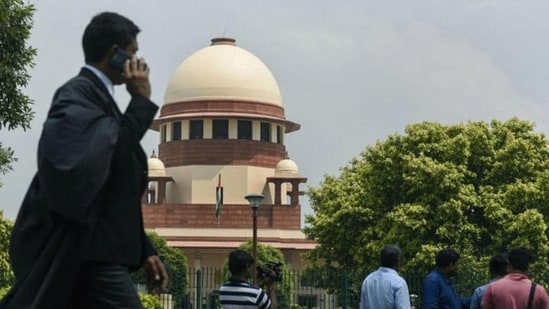Today’s Current Affairs: Landmark Supreme Court Judgment on Enforcement Directorate’s Arrest Powers
The Supreme Court has made a significant ruling on Thursday, May 16, stating that the Enforcement Directorate and its officers cannot arrest an accused under the Prevention of Money Laundering Act after the Special Court has taken cognizance of the complaint. This decision has far-reaching implications for cases involving money laundering allegations. The bench of Justice Abhay S Oka and Ujjal Bhuyan emphasized that the ED must apply to the special court if they seek custody of an accused, marking a shift in how such cases are handled. This judgment comes after a legal battle over bail conditions for individuals accused of money laundering, highlighting the complexities of the legal system in dealing with financial crimes.
1. What did the Supreme Court rule regarding arrest by Enforcement Directorate (ED) under PMLA?
– ED officers can arrest an accused after the Special Court takes cognizance
– ED cannot arrest an accused after the Special Court takes cognizance
– ED can arrest an accused without any limitations
– ED can only arrest an accused with prior approval from the Special Court
Answer: ED cannot arrest an accused after the Special Court takes cognizance
2. Where does the accused have to apply for custody if the ED wants to arrest them after Special Court’s cognizance?
– High Court
– Special Court
– Supreme Court
– District Court
Answer: Special Court
3. What did the Supreme Court question regarding bail for the accused in a money laundering case?
– Whether bail conditions should be imposed even before the trial court acknowledges the complaint
– Whether bail is necessary in money laundering cases
– Whether regular provisions of Code of Criminal Procedure apply to money laundering cases
– Whether accused can seek bail under PMLA itself
Answer: Whether bail conditions should be imposed even before the trial court acknowledges the complaint
4. What did the Supreme Court say regarding Section 45(1) of PMLA in its previous ruling?
– Validated the section
– Invalidated the section
– Imposed new conditions in the section
– Proposed amendments to the section
Answer: Invalidated the section
What was the judgment passed by the Supreme Court regarding the arrest of accused by the Enforcement Directorate under PMLA?
The Supreme Court ruled that the ED and its officers cannot arrest an accused under Section 19 of the Prevention of Money Laundering Act after the Special Court has taken cognizance of the complaint of money laundering.
What did the bench of Justices Abhay S Oka and Ujjal Bhuyan add regarding custody of the accused?
The bench added that if the ED wants custody of the accused, they would have to apply to the special court for permission.
What did the Supreme Court state regarding the powers of ED and its officers after cognizance is taken by the Special Court?
The Supreme Court stated that once cognizance is taken of the offence punishable under Section 4 of the PMLA based on a complaint, the ED and its officers are powerless to arrest the accused under Section 19. They would need to seek custody of the accused by applying to the Special Court.
What was the case about which led to this judgment by the Supreme Court?
The case was addressing whether an accused in a money laundering case has to meet the stringent twin-test for bail even after the special court takes cognizance of the offense.
What is the background of the legal issues discussed in the Supreme Court’s judgment?
The legal issues stemmed from a Punjab and Haryana high court ruling that denied pre-arrest bail to several accused in a money laundering case related to an alleged land scam. The Supreme Court had granted interim protection to the accused in January.
In today's current affairs, the Supreme Court made a significant ruling on Thursday, May 16th. They declared that the Enforcement Directorate (ED) and its officers cannot arrest an accused under the Prevention of Money Laundering Act after the Special Court has taken cognizance of the complaint. The bench of Justices Abhay S Oka and Ujjal Bhuyan stated that if the ED wants custody of the accused, they must apply to the special court. This judgment came in response to a case questioning the bail conditions for an accused in a money laundering case. The Supreme Court's decision clarifies the legal process in such cases and ensures that due process is followed.
| Today's Current Affairs |
|-------------------------------------------|
| The Supreme Court ruled on Thursday, May 16, that the Enforcement Directorate (ED) and its officers cannot arrest an accused under the Prevention of Money Laundering Act (PMLA) after the Special Court has taken cognizance of the complaint of money laundering. The bench of Justices Abhay S Oka and Ujjal Bhuyan stated that if the ED wants custody of the accused, they must apply to the special court. The verdict addressed whether an accused in a money laundering case must meet strict bail conditions even after the special court acknowledges the offense. In response, the Supreme Court questioned if bail under regular CrPC provisions could be sought by the accused once they appear before the court. Justice Oka emphasized that the ED cannot arrest a person once a complaint is filed. The legal issues arose from a Punjab and Haryana high court ruling denying pre-arrest bail to accused in a money laundering case related to a land scam. The Supreme Court had granted interim protection to the accused in January. In 2017, the Supreme Court invalidated a section of the PMLA but the provision was later reinstated by the Centre after amendment. |







1 thought on “Current Affairs Question and Answers: Supreme Court bars ED from arresting accused post special court’s recognition of PMLA complaint | Latest News India”